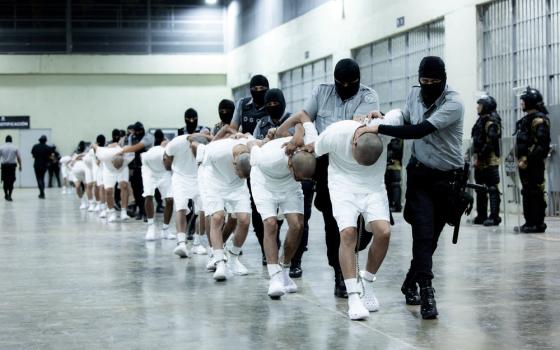Before my current job, which I took about three years ago, I was in the news business for nearly all my adult life. And throughout that time, fellow Catholics would regularly quiz me about why the news media so often "went after" the church.
I'm guessing an article by The New York Times' public editor this Sunday is going to have my phone ringing again.
In his Sunday piece, Clark Hoyt discusses the negative reaction a Times' feature and a Times' column has provoked from New York's archbishop, Timothy Dolan. The two works include columnist Maureen Dowd's recent brush-back of the Vatican's investigation into the lives of American nuns, and a front-page article about a priest who fathered a son after a long relationship with a parishioner.
Archbishop Dolan, in his own online blog, called out the Times for anti-Catholicism -- a cry, mostly, of "come on, enough already!" He wondered why the church was the constant subject of articles about sexual abuse, when similar scandals by the ultra-Orthodox Jewish community in Brooklyn rated no such continual pressure.
For journalists, here's the difference: the Roman Catholic church, especially in New York, is a powerful political institution. I'm sure there are scandals all the time in the Green Party and the Socialist Workers' Party -- but journalists tend to focus on misdeeds among Democrats and Republicans, because that is where the power lies.
When I was growing up in The Bronx in the 1960s, Cardinal Francis Spellman was a figure who loomed over New York politics. He quietly pulled levers of power at City Hall and the mayor's mansion -- and he was just the latest in a string of archbishops and cardinals who more-than-simply-influenced local politics. Episcopalian leaders -- who counted among their members the wealthiest and oldest New York families clustered along Manhattan's East Side -- wielded no such power. One got the impression they saw such machinations as unseemly.
City newspapers and magazines, then, covered the church not only as a spiritual institution, but as a center of power -- and everything it did was at times analyzed through that power prism.
The sex abuse scandal fits this dynamic -- it is, at heart, a story of the powerful exploiting the unpowerful, something no journalist can look away from.
When I was a network news producer, I did a long segment on the Hare Krishna movement in the United States, which a few years ago was enmeshed in a sex abuse scandal of its own -- one no less terrible in its details than what had happened in the church. And, yes, the Hare Krishnas did not get as much attention. For one thing, they owned-up and settled with victims relatively quickly. But the other reason: there are by some estimates, fewer than 300,000 Krishnas worldwide. There are 66 million Catholics in the U.S. alone.
Numbers matter; numbers equal power, influence, authority.
Look, are there members of the press who "go after" the church because they are simply eager to "expose" problems there? Sure. I've found some coverage of the sex-abuse scandal, for example, to be overly shrill and lacking much context about what the church is doing to change and to prevent abuse from happening again. And it is tough to see a bishop or archbishop's statements treated with the same skepticism reporters use when quoting the local political party hack.
Some of this is just wrong, some of this easily comes off as a media fixation. But some of this also simply comes with the territory: the church is big and powerful and vocal. And journalists can't help but take notice.




